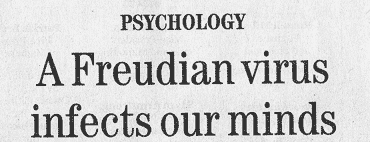

A Freudian virus infects our minds
January 17, 2002
 We
often compare the human mind to a computer, discussing matters of input,
output and memory. What we need to do now is carry that analogy a bit
further and begin talking about mind viruses. While we've been worrying
about detecting, repairing, quarantining and deleting the many Internet
viruses that infect our computers, we've been ignoring a virus that
is doing equally nasty things to the way our minds function.
We
often compare the human mind to a computer, discussing matters of input,
output and memory. What we need to do now is carry that analogy a bit
further and begin talking about mind viruses. While we've been worrying
about detecting, repairing, quarantining and deleting the many Internet
viruses that infect our computers, we've been ignoring a virus that
is doing equally nasty things to the way our minds function.
It causes us to think in an irrational way when it comes to understanding
flawed lives. Automatically we accept the notion that there must be
something that causes people to fail. We assume that they're not responsible
for how their lives turned out and that whatever went wrong is not their
fault. We're compelled to think they've been psychologically hurt and
invisibly harmed. This "Freudian virus"-for it was Freud who
first theorized how sexual experiences in childhood affected people
throughout their lives-has been burrowing into minds for decades, planting
the notion that psychological problems of adulthood are manifestations
of a traumatic childhood often involving sexual abuse. Now, whether
its drug abuse, alcoholism, depression or even immoral or criminal behaviour,
the assumption is that the root cause is clear. Other explanations,
however plausible, are simply ignored.
Once we tell ourselves that we know the cause, then all problems can
be understood as "damage" for which someone else is held to
blame. We can't possibly hold a poor victim responsible for his or her
unfortunate life. To do so is not only politically incorrect, it's downright
cruel, and it's dismissed as faulty thinking-a system error.
Like the "Millennium" or "ILOVE-YOU" viruses that
spread from individual computers to eventually contaminate large corporate
and government computers, this Freudian virus has infected the way our
social, political and legal institutions work.
Take for example, last month's B.C. Supreme Court judgment awarding
a 51-year-old man $233,400 for sexual abuse that purportedly happened
more than 40 years ago at a residential school run by the Roman Catholic
Order of the Oblates. The plaintiff testified that Martin Saxey, a baker
at the school who is now long dead, sexually assaulted him.
As proof of the abuse, the plaintiff, identified only as E. B., claimed
he has suffered from bedwetting, a failed marriage, anxiety, sexual
problems and symptoms of post-traumatic stress disorder (a diagnosis
which in itself relies on the assumption of earlier abuse). All of these,
as well as frequent unemployment and several criminal offences, he attributed
to the sexual abuse. "It was hard to cope with life, it was hard
to cope with society," he testified.
His admission of alcohol abuse was also considered an indication of
the supposed earlier abuse. Wrote Justice Brian Cohen: "The evidence
demonstrates that the plaintiff used alcohol at least partly as a form
of self-medication in an attempt to forget about the abuse."
Lawyers for the Oblates challenged this infected thinking, arguing that
all E. B.'s siblings were also alcoholic and that while several had
died from alcohol-related causes, none of them had been abused. Although
acknowledging that it was "highly likely that the plaintiff (would)
have developed an alcohol problem in any event," Justice Cohen
still concluded that the alcohol abuse was a result of the sexual abuse.
"At this stage," he wrote, "the Oblates can only escape
liability if they can demonstrate that the plaintiff would have become
an alcoholic regardless of the sexual (abuse)"-a logical impossibility.
Last year, B.C. Chief Justice Donald Brenner wrote that in cases of
historical sexual assault, the plaintiff is likely to be claiming for
chronic injuries, often psychological in nature. "Unravelling the
question of causation in these cases arising as they do from (acts)
committed so long ago is a daunting task."
Not so for those contaminated with the Freudian virus. What should indeed
be an overwhelming task is made simple by the circular reasoning that,
if someone's life is a mess, it shows that they've been abused and that
the abuse has ruined what would otherwise have been idyllic. Unlike
the technological varieties for which there is anti-virus protection,
this infection has, at present, no antidote. How, I wonder, might one
develop the software able to debug our infected minds?
tanadineen.com
@ Dr.Tana
Dineen
1998-2007
by
Dr. Tana Dineen, special columnist,